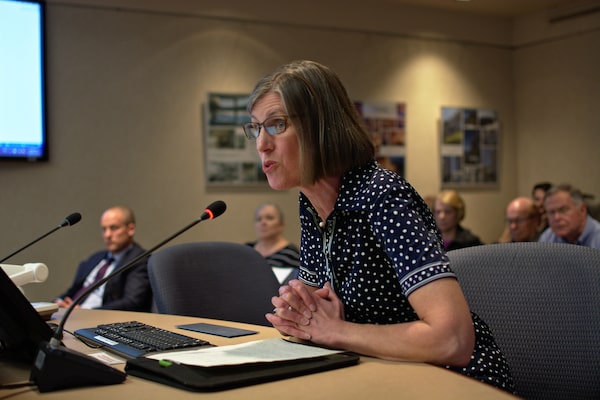
Teachers in West Vancouver often refer to themselves as the migrant work force, according to teachers’ association president Renée Willock, seen addressing council on April 29, 2019. Most would prefer to work closer to home, she added, which is making it difficult for the city to attract and retain teachers.Nick Laba/The Globe and Mail/The Globe and Mail
One of Canada’s wealthiest cities plans to develop housing geared to moderate-income residents such as teachers and first responders, an effort to respond to the sky-high cost of housing in the community the workers serve.
The plan is modelled after a similar one in the resort community of Whistler. On Monday, West Vancouver Council voted unanimously to take the proposal to a formal planning phase. It’s a response to data that show nearly three-quarters of the West Vancouver work force currently commute from outside the city.
“We know what we have a lot of in this community. We have a lot of luxury residences. We have a lot of large homes. We have a lot of luxury condos," Councillor Craig Cameron said.
Mr. Cameron noted 64 per cent of the housing in West Vancouver is single-family housing; 3 per cent is townhouses; 8 per cent is in low-rise buildings.
West Vancouver also has one of the Lower Mainland’s lowest vacancy rates, at 0.4 per cent in 2017.
"So we have a missing middle in terms of housing type, which this fits,” Mr. Cameron said.
The plan is unique in the Lower Mainland, though it’s been considered in other cities grappling with stratospheric housing costs. London has attempted to develop housing solutions for what it calls “key workers" – nurses, teachers, firefighters, police.
Rents in West Vancouver range from $1,200 for a studio apartment to $3,400 for a three-bedroom and those rates are even higher if the unit is new.
Police constables on the West Vancouver force make between $70,152 and $100,224. A teacher at a starting wage makes $46,898.
The West Vancouver plan proposed by staff is to build two, six-storey towers with an estimated 167 rental units. Rents in those units would be offered at 70 per cent of market value. A third building in the project would be condos.
The project would be built by a developer – or developers – chosen by the district. Municipal staff concluded the enticement for the developer to build the rental component will be the district’s offer to lease the land to the developer at a substantially reduced rate.
The property was purchased by the district in 2014 at a cost of $16-million. The city estimates it will see $26-million of revenue once the project is completed.
According to the district’s official community plan, the new development’s principal target market is moderate-income people who work in West Vancouver and families with children who attend school there.
Mr. Cameron said the municipality will find a developer for the project. Afterward, a non-profit will be chosen to operate the units. According to the current proposal, the city would retain ownership of the property.
How to decide who qualifies for the below-market rentals has yet to be worked out, but Whistler’s model would provide guidance.
The Whistler Housing Authority was established in the community in 1997 to respond to the lack of housing for the workers who keep the resort community running. The agency oversees nine buildings and units are reserved only for people who can show they are employed in the community and don’t own real estate elsewhere, among other restrictions.
Jay Wollenberg, an external consultant retained by West Vancouver for financial advice on the project, said as long as the district retains ownership of the property, provisions of the Local Government Act allow the municipality to stipulate conditions on the people who can live there.
West Vancouver Teachers’ Association president Renée Willock said teachers in the municipality call themselves the migrant work force. She noted that at a time when the province is facing a teacher shortage, those in West Vancouver often leave the community if they have the option to work closer to where they live."
“Many are making that decision, which is why we’re beginning to see a problem attracting and retaining teachers in West Vancouver,” she said.
The plan also includes an adult day centre on one of the lower floors of the rental buildings that would provide supervised programming in a group setting for dependent adults.
With a report from Frances Bula